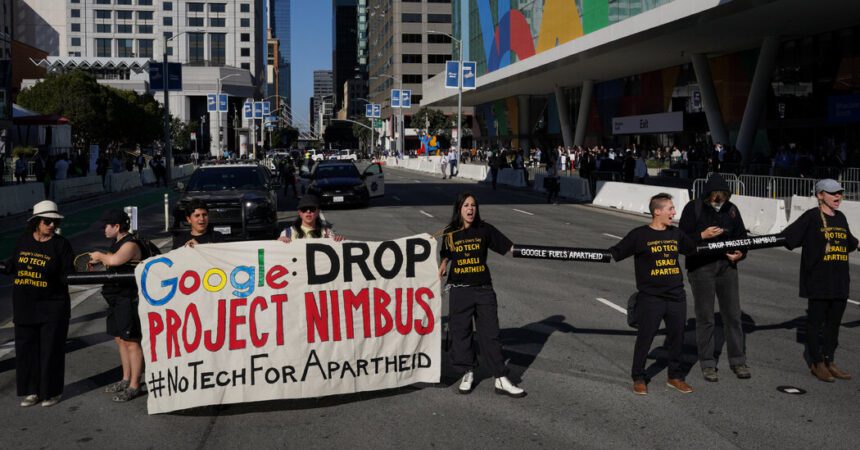“You have to be very, very, very careful, because any kind of criticism of the Israeli state can easily be considered anti-Semitism,” he said in an interview. Mr. Gilani, a 38-year-old American born to Pakistani immigrants, said his caution also stemmed from a lifetime of being misunderstood and misrepresented as Muslim.
It was before October 7.
In the month since Hamas launched an attack inside Israel and Israel responded with a campaign of bombing and invasion of the Gaza Stripdiscussions on the subject at Google – for Muslims and Jews – have descended into a quagmire of hostility and intolerance, Mr. Gilani and other employees say.
Israeli and Jewish employees have expressed anger over messages posted on Google’s internal channels, including at least one openly anti-Semitic, and on Wednesday, a group of employees the workers published a open letter addressed to Google executives, accusing the company of applying double standards, allowing “freedom of expression for Israeli Googlers over Arab, Muslim and Palestinian Googlers.”
The letter was not signed by anyone. Instead, it was attributed to “Muslim, Palestinian and Arab Google employees, joined by anti-Zionist Jewish colleagues.” The New York Times spoke with seven Google employees about the issue and reviewed messages posted on employee channels for this article. A few employees, including Mr. Gilani, were willing to be identified, but others asked not to be named for fear of professional consequences.
Pro-Palestinian employees say the company has allowed supporters of Israel to freely express their opinions on the subject, while taking a heavy hand with Muslim employees who have criticized Israel’s retaliation in Gaza.
“I don’t feel safe to say what I want to say,” Mr. Gilani said in an interview before the letter was published.
Google said the acrimony described to the Times by its Muslim and Jewish employees was limited to a small group of its thousands of workers.
“This is a very sensitive time and topic in every business and workplace, and many employees are personally affected,” Courtenay Mencini, a company spokesperson, wrote in a response by email with questions. “The overwhelming majority of these employees do not participate in internal discussions or debates, and many said they appreciated our rapid response and attention to the safety of our employees.
Google is not alone in facing this turmoil. The topic has highlighted divisions at other elite institutions in the United States. colleges, Hollywood and the Democratic Partyto name a few – while statements of solidarity with the Palestinians or calls for an Israeli ceasefire are condemned as undermining Israel’s right to defend itself against terrorism.
Companies struggle to find a solution to the conflict and define clear boundaries around acceptable discourse on the subject. More broadly, anger over the conflict has led to an increase in hate crimes and threats against Jews and Muslims.
Among tech companies, Microsoft removed some posts from workers discussing the conflict, and at Meta, internal tensions also increased when the company removed internal posts from employees supporting other Meta Palestinians.
But at Google, the question has a unique meaning.
Even compared to its Silicon Valley peers, Google has become a hub of employee activism, a legacy of the company’s open and informal founding culture.
In recent years, Google employees have protested the ban on immigration from Muslim-majority countries imposed by former President Donald J. Trump, got out to protest against the company’s management of sexual harassment, formed a union and asked the leaders to stop working with the Pentagon.
The letter sent Wednesday brings to the surface another sore point: Google’s role in a $1.2 billion deal to provide Israel and its military with artificial intelligence and other computing power, technology that , critics and activists say, could be used to monitor Palestinians.
When the contract, dubbed Project Nimbus, took effect in 2021, a number of employees publicly opposed and said they had been threatened for expressing support for the Palestinians, claims similar to those in Wednesday’s letter. Last year, a Jewish Google employee who led an action to have the company terminate the contract resignedclaiming he had retaliated against her.
After fighting broke out last month, employees started a new petition asking Google to cancel Nimbus. As of Tuesday, it had 675 signatures, according to one of the employees.
“Criticizing Project Nimbus has made people targets,” said Rachel Westrick, a software engineer at Google, who said she supported the letter. Ms. Westrick said she also wants the company to condemn violence against Palestinians, as it did with the Hamas attack, and to address the racism her colleagues have faced, according to She.
The company said Google’s role in Nimbus involves providing services for routine work of government agencies and does not apply to highly sensitive or classified projects.
Supporters of Israel view calls to abandon Nimbus and other efforts to boycott the country as hostile to the Jewish state. Jewish and Israeli workers also said the language used by their colleagues was deeply offensive, particularly when Israel’s actions in Gaza were described as “genocide.”
An Israeli employee said she believed the company had allowed many pro-Hamas statements to spread unchecked within Google’s internal communications platforms. According to this employee, Google is slower to internally acknowledge anything regarding Israel, compared to issues such as Black Lives Matter and violence against Asian Americans.
Three people said an employee was fired after writing on an internal company forum that Israelis living near Gaza “deserved to be hit.”
The company issued a statement condemning Hamas on October 7, and days later told its Jewish employees that it was monitoring internal platforms for anti-Semitism and promised to take action — including to fire violators – if justified.
The following week, in an email to staff, Sundar Pichai, chief executive of Alphabet, Google’s parent company, acknowledged that Jewish employees were “experiencing an increase in anti-Semitic incidents” and that Palestinian, Arab and Muslim employees were “Deeply affected by a We are concerned by the rise in Islamophobia and we watch with horror as Palestinian civilians in Gaza suffer significant losses and fear for their lives amid the escalating war and humanitarian crisis.
But the employees behind Wednesday’s letter say that’s not enough: “We demand that Sundar Pichai, Thomas Kurian and other Google executives publicly condemn the ongoing genocide in the strongest possible terms,” Can -we read. Mr. Kurian is general manager of Google’s cloud computing business.
Meta’s supporters of the Palestinians also believe they face unfair treatment. A handful of employees reported that on Workplace, Meta’s internal communications platform, messages including the phrase “pray for Palestine” or otherwise expressing support for the Palestinians – without any mention of Hamas – were being posted. flagged for deletion internally, according to two employees who shared the messages with The Times.
Around the same time Meta employees were experiencing internal difficulties, the company said a “bug” in its code – a mistranslation from Arabic – led to the insertion of the word “terrorist in some users’ Instagram bios if they included the word “Palestine” or a Palestinian flag emoji. The Washington Post and 404 Media earlier reported on some of the problems at Meta.
A Meta spokesperson declined to comment.
Mr. Gilani said he did not see what, if anything, he could say at work about what he saw as the killing of innocent civilians.
He knows the risks of speaking out on such a controversial topic, thanks in part to an experience he had in 2014. After being stopped several times by airport security, he filed a request under of the Freedom of Information Act to try to find out if he was on a watch list. But instead of getting the information, he was approached and questioned by the FBI in Google offices.
But now, he says, he worries that retaliation against Muslim employees will have a chilling effect on speech at Google, and he has developed a playbook on how to talk about the subject at work: Condemn Hamas and Move On .
“I feel like I have to condemn Hamas 10 times before I say one tiny thing criticizing Israel. »
Audio produced by Jack D’Isidoro.











